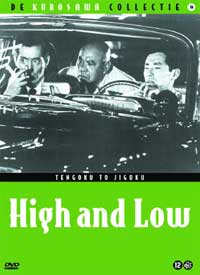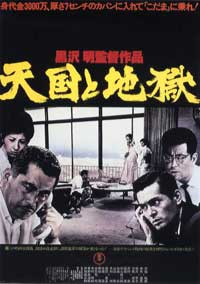 Toshiro Mifune is Kingo Gondo, a shoe manufacturer, in High & Low (Tengoku to Jigoku, literally "Heaven & Hell," 1963). Loosely based on the Ed McBain mystery King's Ransom (1959), Mr. Gondo's personal name is not accidental for its English language meaning. Nor is the idea that Gondo is a King in any way ironical in Kurosawa's typically classist vision.
Toshiro Mifune is Kingo Gondo, a shoe manufacturer, in High & Low (Tengoku to Jigoku, literally "Heaven & Hell," 1963). Loosely based on the Ed McBain mystery King's Ransom (1959), Mr. Gondo's personal name is not accidental for its English language meaning. Nor is the idea that Gondo is a King in any way ironical in Kurosawa's typically classist vision.
Amidst business & finance & in-fighting, kidnappers target the manufacturer's child, Jun (Toshio Egi), but accidentally get Jun's playmate Shinichi (Masahiko Shimazu), son of Gondo's chauffeur, Kawanishi (Yutaka Sada), a poor widower who has no one but Shinichi.
Gondo has a major stock investment in the works that will permit him to gain control of the shoe company. This will mean he can achieve his dream of making shoes that are well-made but stylish. If his rival wins, they will make cheap shoes to sell as bargains & which won't last a month.
But the kidnapper wants cash. Gondo's fifty million yen can buy him his professional dream, or it can pay off the kidnapper of someone else's kid. This builds as a much richer than average film noir mystery with Goro's moral dilmema, human pride, guilt, honor, decency, humiliation, sadness.
Inspector Tekura (Tatsuya Nakadai) sets up in Gondo's house to monitor phone calls. He's assisted by squad leader "Bos'n" Taguchi (Kenjiro Ishiyama), a kind of Tor Johnson type, big, tough, scary & bald, & other first-rate support players among the police force.
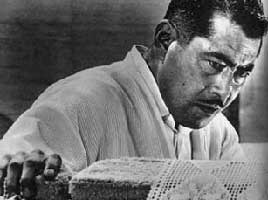 "My work is part of me," says Gondo. "Without it I'll be dead." So he refuses to ruin himself by paying a ransom at such a critical moment of his business life.
"My work is part of me," says Gondo. "Without it I'll be dead." So he refuses to ruin himself by paying a ransom at such a critical moment of his business life.
His process of coming to a different decision is a dialogue-heavy but character-driven journey between the tycoon, the police, the wife (Kyoko Kagawa), & the chauffeur.
The chauffeur alas is rather a snivelling beggar, passive, helpless, grief-stricken, of absolutely no use protecting his own child. His tearjerker performance in reality demeans the "lower classes" due to Kurosawa's recurring attitudes in preference for his own samurai lineage. He almost never imagines such a thing as peasant heroism.
And yet he has chosen as his mogal a shoe manufacturer, a trade dominated by burakumin (descendants of Japan's medieval eta or outcasts, of Korean descent) meaning Gondo, though nowhere does the film say so, has his origins from a level of the class system lower than peasant.
This would at the very least suggest that Kurosawa believed it possible for the low-born to rise above their worthlessness to become the equivalent of lords with vassals. In context of Kurosawa's ouvre this provides an unexpected possibility of liberality. Though treated tentatively, no member of a Japanese audience would've missed the political statement in favor of an often demeaned population.
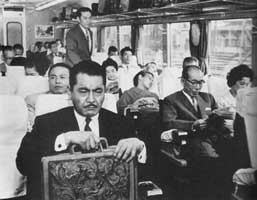 From Kurosawa's chiefly conservative point of view, there is no moral ambiguity in anything that happens, which is the one ingredient a western film noir would have brought to the story. From Kurosawa's chiefly conservative point of view, there is no moral ambiguity in anything that happens, which is the one ingredient a western film noir would have brought to the story.
Gondo is a powerful man who has adapted to the upper class, proving his superiority by chosing humanity over duty, a selfless act of chivalry for the whinging lower class represented by his chauffeur.
To me, however, Kurosawa's "truth" is sufficiently sinister to stand in perfectly for the cynicism of western film noir, despite that that probably wasn't his intent; though who's to say he wasn't being ironical throughout, in making his "Lord" equivalent Gondo quite possibly a man who rose out of the underclass.
It is difficult to know certainly what else besides working in the leather industry ("unclean" labor) contradicts Gondo's upperclass position. For instance, as a wealthy industrialist, Gondo's home is on a hilltop, not hemmed in by other houses, with a view of the city including of one of the poorest districts.
His home appears foremost to be akin to a Lord's castle, awakening jealous hate among those far, far below him who have nothing. But would a rich man's view really include a ghetto? It might if, in spite of all successes, he was still regarded as buraku & his qualities of lordship were applicable mainly to the outcaste community literally in the shadow of his achievement.
Thus Gondo as "king" is really only king of the underclasses, & the classism Kurosawa upholds in so many ways in most of his films actually does give way to a nobler spirit. Assuredly, given the general political statement imbedded in the story, Kurosawa was honestly considering these issues even from his ivory tower, & wanted us to do likewise.
Hitchcock's early films all had one or another cinematic "trick" or decoration, & Kurosawa does this too. The Hitchockian decoration here is the special powder that burns pink, providing the only color in a black & white film, & likely the origin of Spielberg's pink coat in the otherwise black & white flashback scenes in Schindler's List (1993).
In the last third of High & Low we get to know the young, quiet, disturbed kidnapper Ginjiro Takeuchi (Tsutomu Yamazaki) & follow the police procedures in bringing him to justice.
Slowly the police come to admire Gondo, all too much like vassals devoted to a lord. They set out to save his chauffeur's kid & hope to retrieve Gondo's cash in time for his business transaction.
Part of this journey leads into a heroin neighborhood with westernized businesses & clubs & coffeehouses with English language signage & American styled jazz, plenty of foreign patrons, & even some early rock & role.
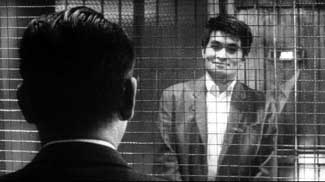 The incidental inclusion of black patrons is quite surprising in a Kurosawa film. Al this represents the loss of decent samurai values in Japan, & the evil influence of the Decadent west. The incidental inclusion of black patrons is quite surprising in a Kurosawa film. Al this represents the loss of decent samurai values in Japan, & the evil influence of the Decadent west.
"Dope Alley" is depicted with deadpan seriousness by Kurosawa, but it comes off as a parody of severe drug addicts, lower & scummier than the filthiest crackhouse today. It has a certain horrific power despite the exaggeration with addicts like George Romero zombies dead & staggering in search of human flesh, & the kidnapper's glasses glowing in the dark so that he seems truly a creature of Hell.
The final meeting between Mr. Gondo & the kidnapper, through a jailhouse window, is an intriguingly calm conclusion, yet approaches the maniacle despite the motionlessness. A brilliant coda, & in light of the subtle political significance, the young criminal's look of smug satisfaction could well be his own sense of superiority given Gondo's probable lowborn origins.
High & Low is two hours & twenty-three minutes of pure suspense with moral issues into the bargain & a fascinating if partially accidental window into samurai ethos surviving in the modern business world.
copyright © by Paghat the Ratgirl
|
